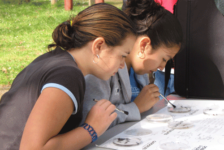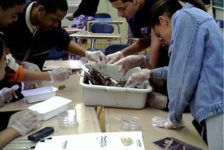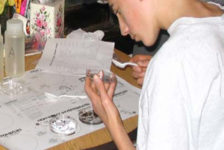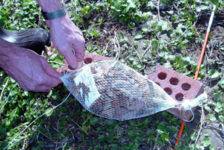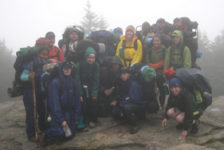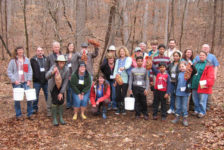In this issue: Pennsylvania High School’s Leaf Pack Experiment; How Not to Lose a Leaf Pack.
“A mind that is stretched by a new experience can never go back to its old dimension.” — Oliver Wendell Holmes.
Winter Edition Showcase: Pennsylvania High School’s Leaf Pack Experiment
Mr. George Ambrose and his 9th grade environmental science students at Penn Wood West Junior High School in Darby, Pennsylvania, are this issue’s stars!
“We recently completed our third annual experiment, and the interest is still high,” Mr. Ambrose reports. Interestingly, he is a computer science teacher, and you may be wondering what a computer science teacher is doing in the stream.
First, a little history. Darby is in southeastern Pennsylvania and takes its name Darby Creek. The waterway helped bring early settlers to the area, as it provided power for a series of mills. Being downstream today, however, means being on the receiving end of pollution and seasonal flooding.
The impact of massive storm water runoff from impervious adjacent lands was never more dramatic than in the wake of Hurricane Floyd in September 1999. A number of students actually lost their homes, and the school was converted into a Red Cross shelter.
This experience motivated Mr. Ambrose to develop a technical elective course in environmental science. It focuses on watersheds and the impact of humans on their environment. Students use the Internet, digital cameras, videoconferencing, and software such as Microsoft Word, Excel, Powerpoint and Inspiration to collect, analyze and report environmental data.
“I felt the need to be trained in some specific field projects,” Mr. Ambrose said, “and Leaf Pack had the added allure of a website where we could post our findings. I wasn’t sure how the students would relate to the ecology issues, but the Floyd experience literally brought it all home to them.”
At the onset of the experiment, students are asked to predict what type of aquatic insects they will find. Most are skeptical, thinking they will not find much aquatic life, given the urban pollution levels. The students have found the experience both enjoyable and educational. “The experiment was really amazing,” said student Yatta Pewa, “because I never thought about what was really in Darby Creek.”
Making real-world connections with students’ lives is what education — and leaf pack — are all about! Congratulations to Mr. Ambrose and his students! As promised in our fall newsletter, Mr. Ambrose will receive a set of new flashcards that detail the natural history of macroinvertebrates.
Scientific Advice: How Not to Lose a Leaf Pack
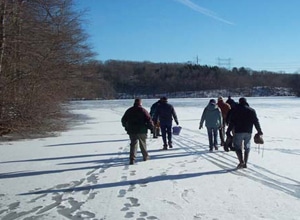
We’ve received quiet a few emails over the last several months regarding loss of leaf packs due to rain storms or snow melts. So we got some advice from Dr. Bernard Sweeney, Director of Stroud Water Research Center:
“Our scientists have also encountered this problem when we first started using leaf packs. The best solution seems to be lash the leaf bag to a construction brick with strong fishing line. Place the brick, with the attached leaf bag, in the stream with the long axis of the brick parallel to the direction of the water flow. Because of its weight and placement, the bricks rarely flip over, even in fairly heavy storms. If bricks with holes in the center are used, they can be ‘staked’ through the holes into the stream bottom providing even more stability.”
We advise this for use in small, low flow streams. (You can in the Fall 2005 LPN Newsletter).
Did You Know … ?
The United Nations has designated 2003 the International Year Of Freshwater. It is a year for us to focus our attention on protecting and respecting our water resources, as individuals, communities, countries, and as a global family of concerned citizens.



